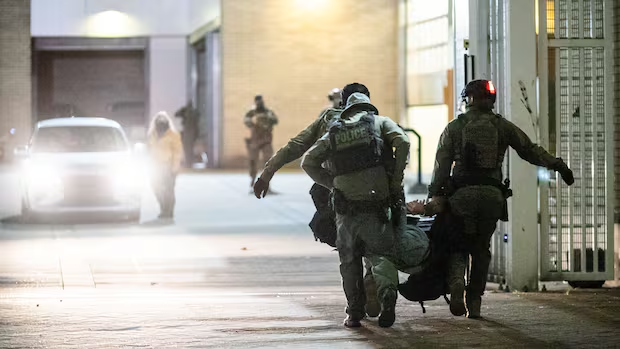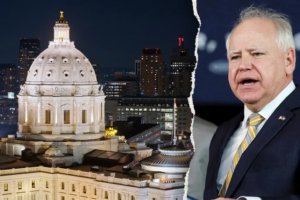
Listen to this article
Estimated 3 minutes
The audio version of this article is generated by text-to-speech, a technology based on artificial intelligence.
U.S. President Donald Trump unlawfully ordered National Guard troops to Portland, Ore., a federal judge ruled Friday, in a legal setback to the administration’s use of the military in American cities.
The ruling by U.S. District Judge Karin Immergut is the first to permanently block Trump’s use of military force to quell protests against immigration authorities, which he is also attempting in Democrat-led Los Angeles, Chicago and Washington, D.C.
Immergut’s ruling replaces her interim order that had prevented the Portland deployment.
Immergut, a Trump appointee, rejected the administration’s claim that protesters at an immigration detention facility were waging a rebellion that legally justified sending in troops.
Trump’s attempts to use military force to tamp down unrest are a sharp break with long-standing but rarely tested norms against deploying troops on U.S. soil.
The administration is likely to appeal Friday’s ruling, and the case could ultimately reach the U.S. Supreme Court.
Claim of ‘war-ravaged’ city
The City of Portland and Oregon Attorney General’s Office sued in September. They alleged the Trump administration was exaggerating occasional violence to justify sending in troops under a law permitting presidents to do so in cases of rebellion.
Duelling narratives emerged during a three-day bench trial. Justice Department lawyers described a violent siege overwhelming federal agents, echoing Trump’s description of the city as “war-ravaged.”
“For months, agitators have used violence and threatened violence against the men and women who serve our country,” attorney Eric Hamilton said at trial.
WATCH | Locals react to Trump’s claim that Portland is ‘war-ravaged’:
Trump says Portland is ‘war ravaged.’ Here’s what locals see
U.S. President Donald Trump says he’s deploying the National Guard ‘to protect war ravaged Portland,’ in a social media post on Saturday. CBC’s Julia Wong spoke with some of the city’s residents ahead of the troops’ arrival, who offered a different perspective on what they’re seeing.
Lawyers for Oregon and Portland said violence has been rare, isolated and contained by local police.
“This case is about whether we are a nation of constitutional law or martial law,” Portland’s attorney Caroline Turco said.
A Reuters review of court records found that at least 32 people have been charged with federal crimes stemming from the Portland protests since they began in June.
Of the 32 charged, 11 have pleaded guilty to misdemeanours, and those who have been sentenced received probation. One protester who threw a knife at an officer and missed pleaded guilty to intimidation and could face up to 20 years in prison.
About half the defendants were charged with assaulting federal officers, with the charges including 14 felonies and seven misdemeanours. Prosecutors dismissed two cases without explanation.
Charging documents describe protesters kicking and shoving officers, usually while resisting arrest. They have also spat on officers and thrown rocks, a water bottle and a kitchen knife, prosecutors say. Photos show officers with scrapes, cuts and other minor injuries.
A Department of Homeland Security officer sprays a protester outside an ICE facility in Portland on Oct. 2. (Jenny Kane/The Associated Press)
Democrats have said Trump is abusing military powers meant for genuine emergencies such as an invasion or an armed rebellion.
Immergut blocked Trump from deploying troops to Portland with an interim order on Oct. 5.
The Ninth U.S. Circuit Court of Appeals is considering the Trump administration’s appeal of that decision.
Three judges, including Immergut, have issued preliminary rulings that Trump’s National Guard deployments are not allowed under the emergency legal authority cited by his administration.





